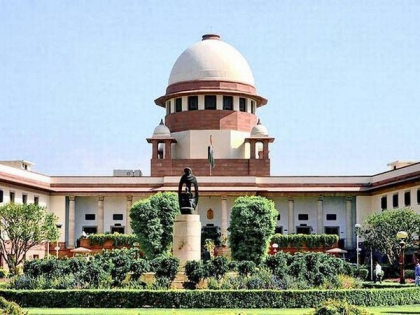SC to hear pleas on June 29 against blacklisting of foreign nationals who attended Nizamuddin congregation
By ANI | Published: June 26, 2020 02:28 PM2020-06-26T14:28:20+5:302020-06-26T14:45:02+5:30
The Supreme Court on Friday posted on June 29 hearing on the pleas filed by foreign nationals, who participated in the Tablighi Jamaat congregation in Delhi's Nizamuddin area, challenging their blacklisting by the Ministry of Home Affairs.

SC to hear pleas on June 29 against blacklisting of foreign nationals who attended Nizamuddin congregation
The Supreme Court on Friday posted on June 29 hearing on the pleas filed by foreign nationals, who participated in the Tablighi Jamaat congregation in Delhi's Nizamuddin area, challenging their blacklisting by the Ministry of Home Affairs.
A bench headed by Justice AM Khanwilkar posted the matter for hearing on Monday saying that there are some technical glitches and asked the counsel of petitioner to serve the copy to central agencies, the Government of India and standing counsel for respective states.
The petitions, filed by the foreign nationals from 35 countries, have sought directions to the Ministry of Home Affairs to remove their name from the blacklist, reinstate their visas and facilitate their return to their respective countries.
One of the petitioners named Fareedah Cheema, a Thai national in the seventh month of her pregnancy, said she was quarantined in March, like other foreign nationals but was released from quarantine only in late May and is still at a facility under restricted movements, without the avenue to go back to her home nation and experience the birth of her child with security and dignity, with her loved ones.
The petitions sought to declare the decision of the MHA of blacklisting the foreign nationals who attended the Tablighi Jamaat congregation as "arbitrary".
"Unilateral blacklisting of 960 foreigners by the Home Ministry vide press release dated April 2, 2020, and the subsequent blacklisting of around 2500 foreigners as reported on June 4, 2020, is in violation of Article 21. Therefore, it is void and unconstitutional as the petitioners have neither been provided any hearing nor notice or intimation in this regard," the plea said.
These foreign nationals presently in India were blacklisted for a period of 10 years from traveling to India for their alleged involvement in Tablighi Jamaat activities.
The Home Ministry had said that foreign Tablighi Jamaat members, who were staying in India in violation of visa rules during the nationwide lockdown implemented to combat the COVID-19 spread, have been blacklisted.
"The en masse blacklisting of foreigners, currently in India, without affording any opportunity to prima facie defend themselves, is an egregious and blatant violation of Article 21 of the Indian Constitution, in as much as this sudden blacklisting has, apart from registration of FIRs against such foreigners, led to the forfeiture of their passports by state authorities, thereby resulting in complete deprivation of their personal liberty sans procedure established by law," the plea said.
It said that MHA's decision has arbitrarily forfeited the personal liberty of foreign nationals who entered on valid tourist visas, by merely alleging their involvement in Tablighi Jamaat activities, despite the guidelines of the Centre placing no bar on attending religious congregations or visiting religious places.
"The MHA baselessly and arbitrarily passed a blanket ban on the aggrieved foreign nationals under the garb of alleged visa violations pursuant to alleged Tablighi activities, forcing such persons to remain in India under restricted movements," the plea stated.
A large congregation orgsed by Tablighi Jamaat in the national capital in March had emerged as a major hotspot of COVID-19 in the country.
The government had said the decision of banning the foreign Tablighi Jamaat members was taken after details of foreigners found illegally living in mosques and religious places emerged from various states across the country.
( With inputs from ANI )
Open in app